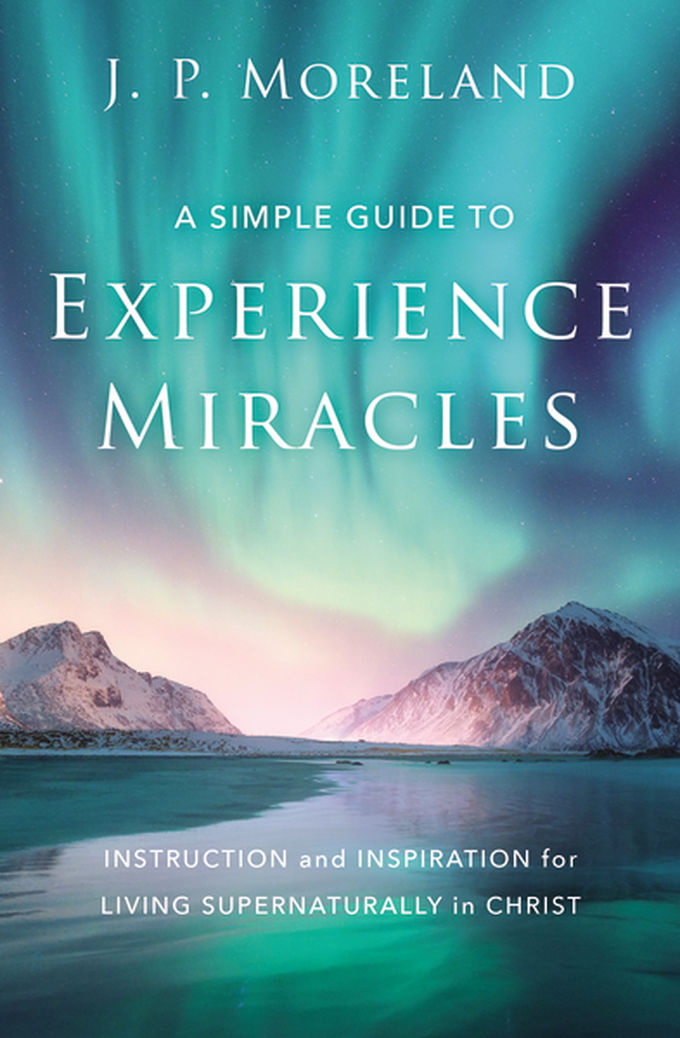Click to join the conversation with over 500,000 Pentecostal believers and scholars
| PentecostalTheology.com
 J.P. Moreland, A Simple Guide to Experience Miracles: Instruction and Inspiration for Living Supernaturally in Christ (Grand Rapids, MI: Zondervan Reflective, 2021), 274 pages, ISBN 9780310124191.
J.P. Moreland, A Simple Guide to Experience Miracles: Instruction and Inspiration for Living Supernaturally in Christ (Grand Rapids, MI: Zondervan Reflective, 2021), 274 pages, ISBN 9780310124191.
Why is a firm conviction in the ongoing reality, power, and love of God necessary for biblical Christianity? In this book, J. P. Moreland successfully presents principles, arguments, and evidence to convict readers on the essential role of the supernatural in Christianity and Christian living. Moreland, a philosopher, theologian, and apologist, utilizes the tools of his multi-disciplinary vocation to present not just a compelling treatise but also an instructive guidebook for a fuller Christian life. Essentially, he posits that miracles, defined as God’s divine intervention in human affairs (page 96), are part and parcel of the relational religion God offers to humanity. Christians, he says, are to expect miracles, live a naturally supernatural life, and stand firm in their conviction that God, whose kingdom is inbreaking, continues to demonstrate his reality today.
Moreland progressively unpacks the book’s core idea by first establishing foundational principles and arguments for miracles and the supernatural in the book’s first two chapters. He then builds on the views presented in the first two chapters by extrapolating five types of supernatural experiences within the loci of prayer (chapter 3-4), miraculous healing (chapter 5-6), divine communication (chapter 5), angelic and demonic manifestations (chapter 8) and near-death experiences (chapter 9). He ends the book with practical guidance on the way forward (chapter 10) and a selected annotated bibliography for further reading (pages 249-259). Moreland unpacks progressively and logically, uses philosophical argumentation and theological support, and thoroughly investigates evidence.
Does God still do miracles today?
As an Asian Pentecostal, whose view on the miraculous firmly affirms the continuation of miracles and the reality of both priesthood and prophethood of believers, I found Moreland’s book as clear, encouraging, and academic. Moreland, a professed Third Waver associated with John Wimber’s Vineyard Anaheim church, uncompromisingly defends the continuation of miracles and supernatural manifestations. His case for miracles supports Christian claims as a whole. He posits that in an era of disbelief in the truth claims of Jesus’ ministry and resurrection (pages 37-43), Christians should stand firm in the evidence and reasonableness of a supernatural God and his inbreaking kingdom on earth (pages 97-99). Accordingly, a biblical supernatural worldview is not something to be embarrassed about; rather, it should be the lens through which Christians view spiritual and mundane reality.
He presents his case not in the usual “Christianese,” instead he used a principle that investigators use—the Intelligent Agent Principle (IAP) (pages 31-33). The use of the IAP as a method of evaluating the veracity of miraculous claims is refreshing and efficacious for a wider audience; that is, it not just convinces Christians but can also potentially evangelize and respond to agnostics and atheists. The use of an extrabiblical principle is novel yet relevant in today’s world, where people require rational proofs presented in a common-sense manner.
Moreover, Moreland presents his arguments with investigative clarity. He knows that truth claims should be backed by credibility and evidence, so he exerts effort to present verifiable data and credible eyewitness testimony. There is no doubt that the experiences mentioned are not fabricated and are not the product of a creative imagination. Hence, Moreland can convince readers not just emotionally but also cognitively.
That said, the discussion on angelic and demonic manifestations, as well as near-death experiences (NDEs), probably needed more theological explication. Although discourse on these themes relies heavily on eyewitness testimony and biblical support is limited, a constructive theological presentation might be more helpful in presenting these themes convincingly. Nevertheless, the chapter on NDEs was encouraging. The use of well-documented incidences provides verifiable data on the reality of life after death, which can be used to minister to those with debilitating fears.
Overall, the book partially explained the Christian supernatural worldview and presented compelling arguments for the continuation of miracles and supernatural manifestations. It convinces readers of the necessity of living a naturally supernatural life, provides practical guidelines for a supernatural ministry, and defends Christianity’s authenticity, which relationally connects us to the one true God. The book can convince readers that God is powerfully real, actively present even in mundane affairs, loving in his interaction, and purpose-filled in his interventions. Furthermore, Moreland was able to hold on to the polar tensions of skepticism and sensationalism; he is able to present a balanced view of an “already-not-yet” eschatology without falling into an over-realized supernaturalism. He was academic, apologetic and also pastoral.
I highly recommend this book as a supplementary guide for training Spirit empowered ministers in academic institutions, as well as for Church-based trainings. Although certain traditions may have different theological stances on the themes presented, the book nevertheless presents a well-thought out explanation and defense of the continuation of miracles and the practice of a biblically grounded supernatural ministry.
Reviewed by Lora Angeline E. Timenia
Publisher’s page: https://zondervanacademic.com/products/a-simple-guide-to-experience-miracles


